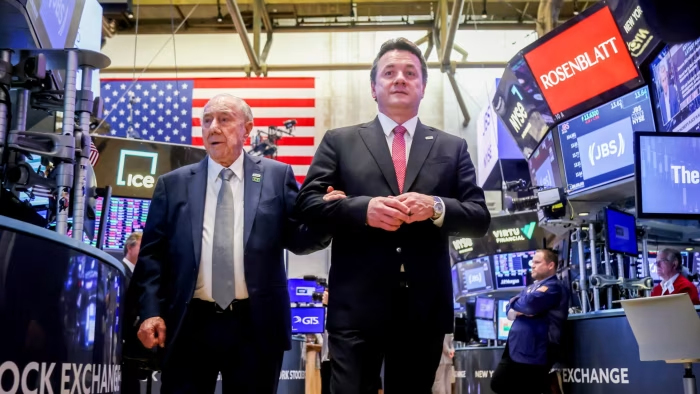Unlock the Editor’s Digest for free
Roula Khalaf, Editor of the FT, selects her favourite stories in this weekly newsletter.
One of the billionaire brothers behind the world’s largest meat company has said the US is not producing enough beef to feed the country’s growing appetite for protein-rich diets, making it more reliant on imports.
“The US is facing the highest beef price in history and so the US needs to import more and more because production is not there to support the demand,” said Wesley Batista, whose family founded and controls Brazil’s JBS.
The average price of a pound of ground beef rose to a record high of $6.32 in US cities in August, a 13 per cent increase in the past year, according to labour department data.
Despite US President Donald Trump’s sweeping “liberation day” tariffs announced in April, the US imported 30 per cent more beef in the first half of the year, compared with the previous year, according to the US Department of Agriculture.
Imports of Brazilian beef soared 91 per cent in the same period, before falling back in August after the US raised tariffs on Brazilian goods from 10 per cent to 50 per cent.
JBS is the leading beef producer in the US, with nine facilities in the country. The group’s wider meat and food business in the US accounted for half of its $77bn revenues in 2024.
Batista, speaking at Rothschild’s consumer conference in London last month, said the growing use of GLP-1 weight loss drugs could be driving growing demand for protein. GLP-1 users are advised to ensure they eat plenty of protein to retain muscle density.
“No one knows exactly what is the impact of these new drugs, Ozempic or Mounjaro . . . but something is happening because protein overall became [a trend],” Batista said. “In the past . . . the doctor said you should not eat too [many] eggs, you should not eat too much protein. Now it’s the other way around”.
A survey last year by the International Food Information Council, an industry-funded non-profit organisation, found 71 per cent of respondents were trying to eat more protein, compared with 67 per cent in 2023 and 59 per cent in 2022.
Batista, who was formerly JBS chief executive and now sits on its board, said tariffs were not hurting JBS because the business produces the majority of its beef for the US market domestically.
“Of course products are still getting more expensive in some markets, but demand is still very strong, especially in the US,” he added.
Larissa Alvarez, analyst at financial services and trading company StoneX, said the rise in US beef prices “is mainly driven by the reduced cattle supply, with the smallest herd since the 1950s”.
Droughts in the American west and south-east have dried up grazing lands and forced US ranchers to shrink their herds. Record high prices for calves have also spurred ranchers to cash in instead of breeding them.
“[This is] combined with structurally strong domestic demand given the high per capita consumption, as the country is one of the largest consumers in the world,” said Alvarez.
Controlled by Wesley and Joesley Batista, whose father founded the company more than 70 years ago, JBS has grown from a provincial slaughterhouse into a titan of the global food industry.
The company, which is also the second largest chicken and pork producer in the US, has begun diversifying into eggs, fish, ready meals and plant-based products in recent years.
The brothers, who own just under half of JBS shares but hold a significant majority of its voting rights, fulfilled a long-held dream of a US listing by shifting JBS’s primary trading venue from São Paulo to New York in June, overcoming fierce opposition from environmental activists. Since then shares in the São Paulo-headquartered group have risen 3.5 per cent, valuing it at $15.9bn.
Over the past decade JBS was embroiled in a political corruption scandal in its home country and been heavily criticised by campaign groups for its alleged contribution to the destruction of the Amazon rainforest by cattle farming.
The company has said it is rooting out deforestation from its supply chains and Batista said last month there was a lot of scope for Brazil’s beef sector to become more efficient.
“We are working everywhere with farmers . . . to help them to be able to produce more . . . with the same amount of land, with the same amount of resources,” said Batista. He added that US farmers could produce the same amount of beef with half the herd size as their counterparts in Brazil, thanks to selective breeding and superior nutrition.
